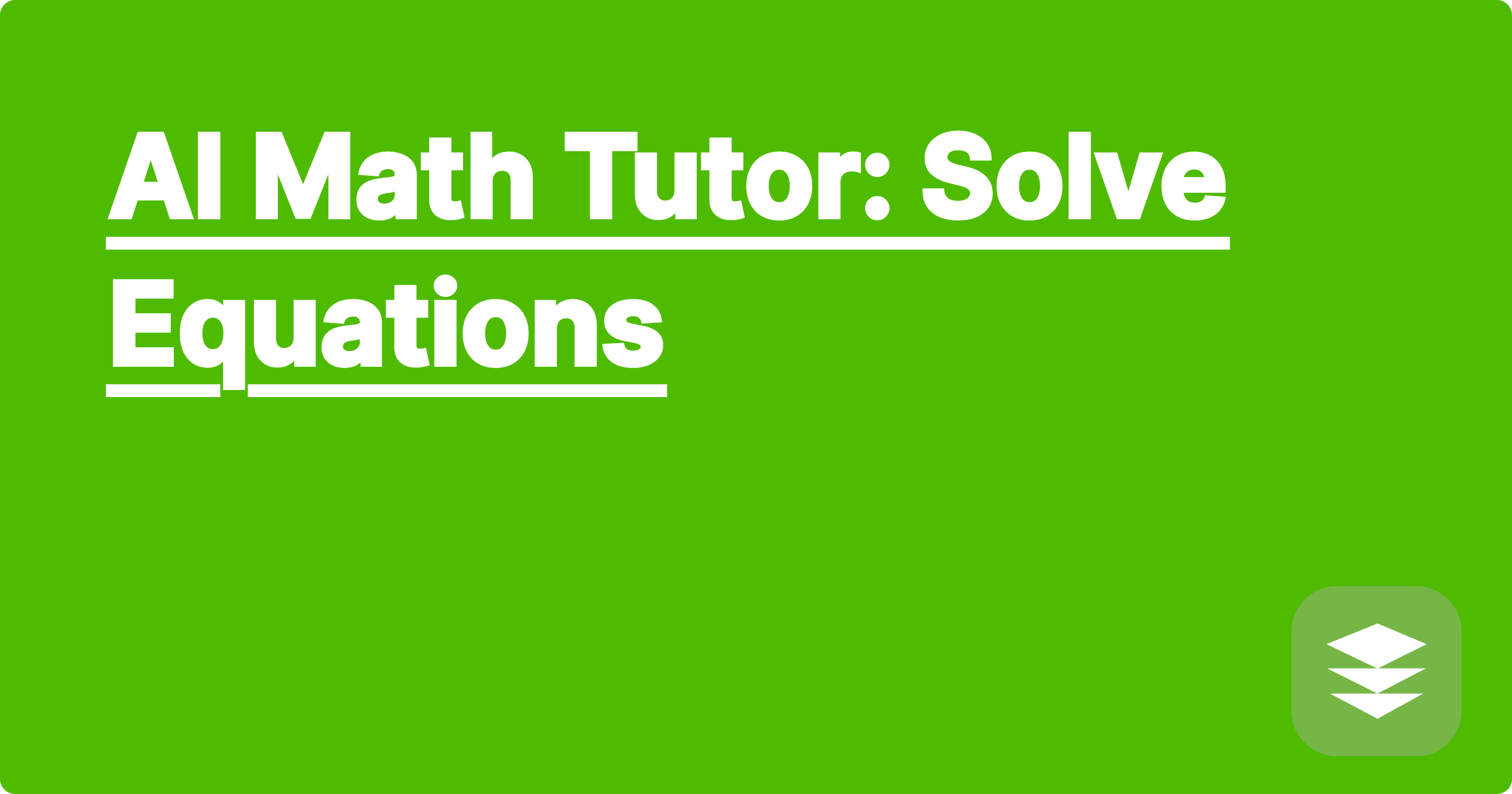
STEM fields often present complex mathematical challenges that can hinder students and researchers alike. Grasping intricate concepts, solving complex equations, and applying mathematical principles to real-world problems can be daunting. Fortunately, the advent of artificial intelligence offers powerful new tools to assist in navigating these mathematical landscapes. AI-powered math tutors can provide personalized support, step-by-step guidance, and instant feedback, empowering STEM learners to overcome obstacles and achieve greater understanding.
This emergence of AI math tutors is particularly significant for STEM students and researchers because it democratizes access to expert assistance. Traditionally, students struggling with math might have relied on limited resources like textbooks, tutors, or professors, which can be expensive or inaccessible. Researchers facing complex mathematical problems might spend valuable time and effort deriving solutions. AI tutors offer a readily available, cost-effective, and efficient alternative, allowing learners at all levels to tackle challenging problems with confidence and accelerate their progress in STEM fields.
Mathematics forms the bedrock of many STEM disciplines. From fundamental calculus in physics to intricate statistical models in biology, a strong mathematical foundation is essential for success. However, many students and researchers encounter difficulties in mastering the necessary mathematical skills. These challenges can range from understanding abstract concepts to solving intricate equations. The sheer volume and complexity of the material can be overwhelming, leading to frustration and hindering progress. Furthermore, traditional learning methods often lack the personalized support and immediate feedback necessary for effective learning. This can leave learners feeling lost and discouraged, ultimately impacting their academic and research pursuits.
AI-powered tools like ChatGPT, Claude, and Wolfram Alpha offer a promising solution to these mathematical challenges. These tools leverage the power of natural language processing and advanced algorithms to provide step-by-step guidance, explain complex concepts, and even solve equations. Users can interact with these tools conversationally, posing questions and receiving personalized responses tailored to their specific needs. This interactive approach fosters a deeper understanding of the underlying mathematical principles, rather than simply providing answers. By breaking down complex problems into manageable steps, AI tutors empower learners to develop problem-solving skills and build confidence in their mathematical abilities.
Using AI math tutors is remarkably straightforward. Begin by clearly defining the problem you want to solve. This could be a specific equation, a concept you're struggling to understand, or a real-world problem requiring mathematical analysis. Next, choose an AI tool that suits your needs. For example, Wolfram Alpha excels at symbolic computations and complex calculations, while ChatGPT and Claude are adept at explaining concepts and providing step-by-step guidance. Once you've selected a tool, input your problem using natural language or mathematical notation, depending on the tool's capabilities. The AI tutor will then process your input and generate a response. This response may include a step-by-step solution, an explanation of the underlying concepts, or even alternative approaches to the problem. Review the response carefully, asking clarifying questions if needed. Many AI tutors allow for interactive dialogue, enabling you to delve deeper into the solution and gain a more comprehensive understanding.
Consider the example of solving a differential equation. You could input the equation into Wolfram Alpha, which would not only provide the solution but also offer visualizations and related information. Alternatively, you could use ChatGPT or Claude to explain the concepts behind solving differential equations, walking you through the process with specific examples. In another scenario, suppose you are struggling with a statistical concept like hypothesis testing. You could ask ChatGPT to explain the concept in simple terms, providing examples and illustrating the different steps involved. These examples highlight the versatility of AI math tutors in addressing a wide range of mathematical challenges across various STEM disciplines. Furthermore, these tools can be used to generate code snippets in languages like Python, allowing for practical implementation of mathematical solutions in research and development projects.
To effectively leverage AI math tutors in your STEM education and research, consider these strategies. First, actively engage with the tool. Don't simply rely on it to provide answers; instead, use it as a learning partner, asking questions and seeking clarification. Second, focus on understanding the underlying concepts rather than memorizing solutions. AI tutors can help you break down complex problems and grasp the fundamental principles, leading to a deeper and more lasting understanding. Third, experiment with different AI tools to find the one that best suits your learning style and specific needs. Each tool has its strengths and weaknesses, so exploring different options can enhance your learning experience. Finally, remember that AI tutors are tools, not replacements for human interaction. Combine their use with traditional learning methods, such as attending lectures, working through textbooks, and collaborating with peers, to maximize your learning potential.
In conclusion, AI math tutors offer a powerful new approach to tackling mathematical challenges in STEM fields. By providing personalized support, step-by-step guidance, and instant feedback, these tools empower learners to overcome obstacles, develop problem-solving skills, and achieve a deeper understanding of mathematical concepts. Embracing these technological advancements can significantly enhance your learning journey and unlock new possibilities in your STEM education and research endeavors. Explore the available AI tools, experiment with different approaches, and discover how these innovative resources can help you succeed in the exciting world of STEM.
AI Homework Help: STEM Made Easy
Ace STEM Exams: AI Study Guide
AI for Lab Reports: Data Analysis